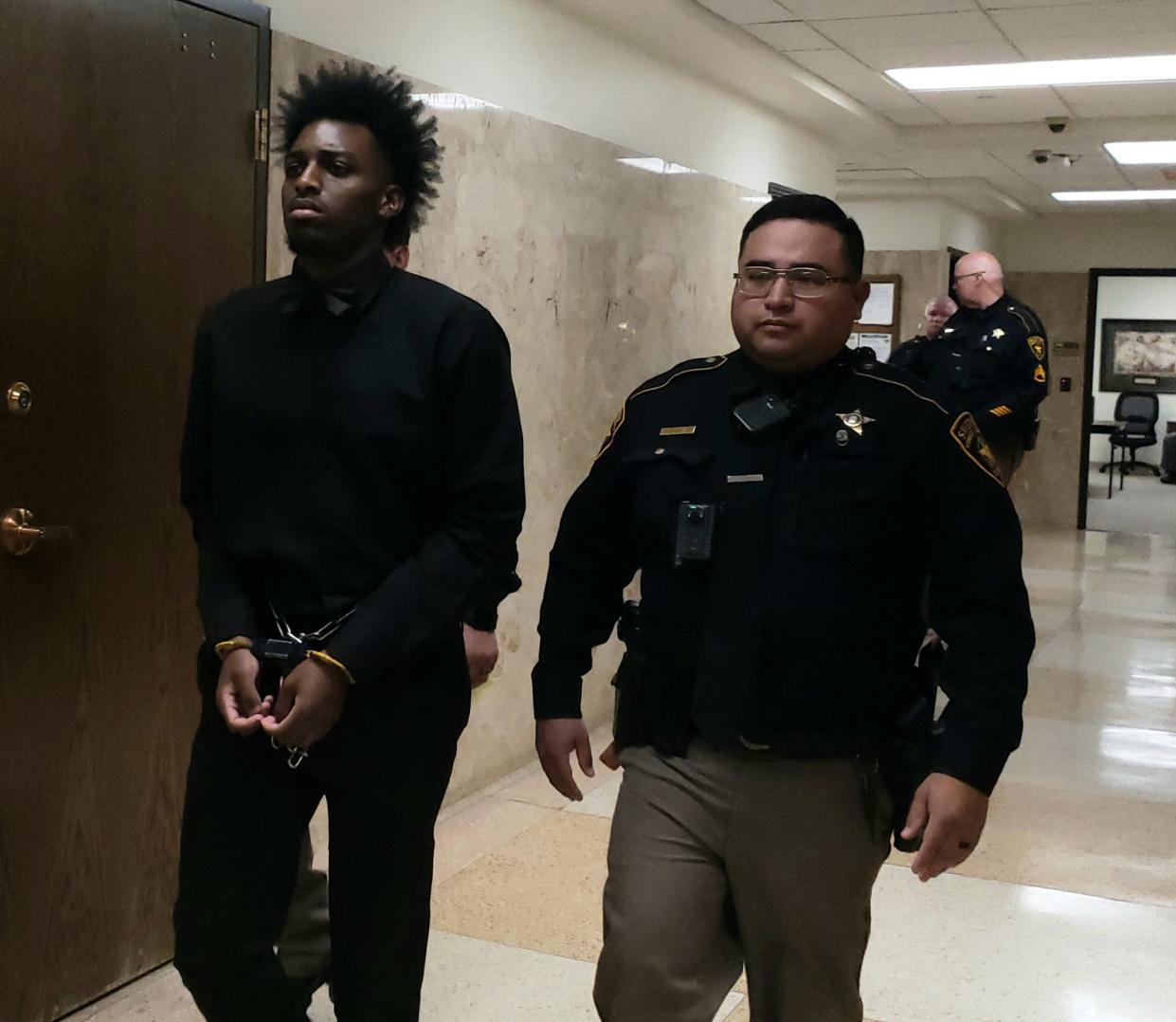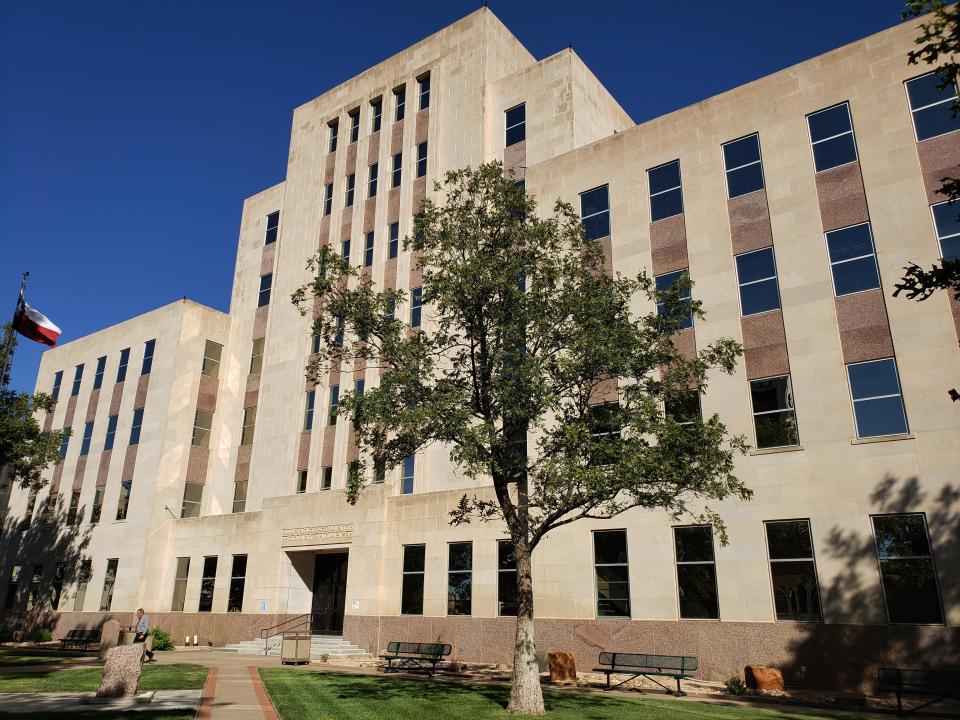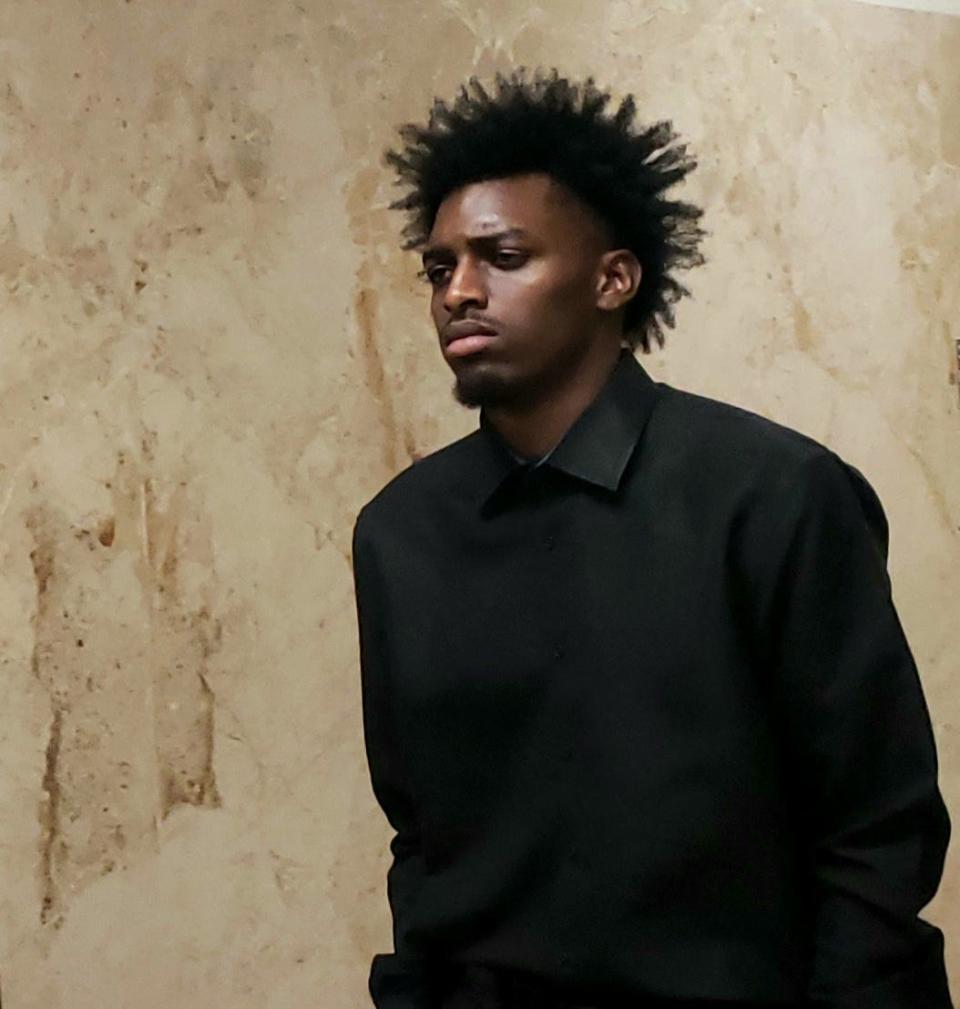Apologies, forgiveness and punishment shared as man sentenced for deadly shooting

Before deputies escorted Darius Johnson Jr. out of the courtroom to begin serving his 20-year prison sentence for killing a man last year, Johnson asked his attorney to extend a message to the victim's family, who were sitting in the gallery.
"My client would like to apologize to the Colon family," Jeff Nicholson said.
Christopher Colon Sr. who sat with his family in the courtroom during the weeklong trial, nodded his head in acknowledgement and thanked him.
Johnson, 19, was sentenced to prison after jurors rejected his self-defense claim in the June 5, 2022 shooting death of 39-year-old Steven Colon at his home in the 1700 block of 25th Street.
Jurors deliberated for about 35 minutes Thursday before returning to the 140th District Court with their verdict finding Darius Johnson Jr. guilty of murder. He faced five years to life in prison.
Johnson, who has been held at the Lubbock County Detention Center since June 16, 2022, surrendered to authorities in Marlin after investigators in Lubbock obtained a warrant for his arrest in Colon's slaying.
He pleaded not guilty to the charge on Monday when the trial began. However, after prosecutors rested their case, Johnson took the stand and admitted to shooting Colon, saying he did it out of fear for his and his companion's safety that day. He told jurors if he were placed in the same situation again, his actions wouldn't change.

To prevail on a self-defense claim, jurors had to believe Johnson's deadly actions that night were justified because he reasonably believed that Colon presented an unlawful and immediate threat to the lives of himself or his friends.
Prosecutor Laura Beth Fossett argued that the law didn't support Johnson's self-defense claim because none of the evidence showed Colon was about to use any force -- deadly or otherwise -- or that his use of force would have been unlawful.
An argument turns deadly
Jurors heard four days of testimony that showed the shooting stemmed from an argument between Colon and Johnson's companion, 21-year-old Adonias Tzehaie.
Tzehaie, who drove a white Grand Marquis to Colon's home that night, told jurors that he had met Johnson a few days before. He said he, Johnson and another teenager, Mikeal Coleman, were essentially living in his vehicle in the days leading up to the shooting.
Hours before the shooting, he said the three of them went to a restaurant in north Lubbock for lunch where they also celebrated Johnson's 18th birthday. That night, he drove to Colon's home to pick up a dirt bike he had left with him. He said he'd known Colon for years and often went to him to help fix his vehicle.
Video from security cameras at Colon's parents' house two doors down showed Tzehaie pulling up to the chain-link fence in the front yard of Colon's home.
However, the camera was motion-activated and would cut off when it couldn't detect movement, leaving a 26-second gap where the shooting would have happened. Jurors relied on testimony from 10 witnesses, including Johnson, about the moments that led up to the shooting.
As Tzehaie approached the fence, Johnson and Coleman could be seen exiting the vehicle and standing beside it.
Tzehaie said he asked for Colon, who immediately appeared agitated.
He told jurors he became upset when Colon told him his bike wasn't there and that someone had already picked it up a few days before. Tzehaie said he became upset, believing Colon was lying and had sold the bike.
He said he began walking along the fence, looking to see if his bike was there and began arguing with Colon, who told him to leave.
He said he decided to leave and made his way to the driver's side door, telling Colon, "you got something coming."
He said Colon told him, "Let's do it right now, then."
Witnesses at the scene told jurors that the two men were separated by a fence throughout the argument.
Tzehaie said he heard someone hurl an insult at Colon then saw Johnson pull a gun from his backpack and fire at Colon, who remained inside the fence.
Patrick Colon told jurors he was working on a pickup truck at his house when the Grand Marquis arrived. He stopped when he heard his brother arguing with someone and walked behind his brother.
As the argument escalated, he told jurors he could see Johnson begin reaching into a backpack. He said went into his house to get a pistol to back up his brother.
"There was just something going on that I did not like," he said.
However, as he realized he'd left the weapon in his girlfriend's vehicle, which was parked across the street, gunfire erupted and he turned to see his brother on the ground.
He said he stopped to briefly check on his brother, then ran to his girlfriends' vehicle to get his weapon.
Video played to jurors showing Patrick Colon sprinting to a white vehicle then run to a black SUV to chase after the fleeing Grand Marquis.

A weapon was never found on Colon and none of the nine witnesses -- including Johnson -- at the scene told jurors they saw him reach for a weapon.
Tzehaie told jurors that he, Coleman and Johnson got into the vehicle and he drove away.
He said he doesn't remember that anyone spoke as they drove away.
"I just seen (Colon) fall," he said. "So after that, I was scared. I got in my car and as I was leaving I was being chased."
Colon's next door neighbors told jurors they watched the argument through their windows and heard Colon tell Tzehaie to leave.
Eduardo Elizalde said Colon appeared to be backing away before he was shot.
"He was already turning," he said. "He was already like, moving back like he was done with the conversation."
Prosecutors played video from a responding Lubbock police officer's body worn camera that showed him arriving at the scene and treating Colon's gunshot wounds as he lay on the ground.
Colon's family members, who sat in the courtroom during the trial, wept as they watched Colon groaning in pain. His mother, Imelda, could be heard pleading with him to hold on. He was taken by ambulance to University Medical Center where he died the next day.
A Tarrant County deputy medical examiner told jurors that an autopsy report showed Colon suffered gunshot wounds in his back and buttocks.
A claim of self defense
Johnson admitted to jurors that as he watched the argument between Tzehaie and Colon, he became afraid for himself and his friend and shot Colon.
"I'm telling this jury I was scared for my life (and) for (Tzehaie's) life," he said.
Under cross examination by prosecutors, Johnson told jurors Colon wasn't armed with a weapon and didn't appear to be reaching for one when he shot him.
He said he believed Colon was following Tzehaie along the fence as they argued and sensed the tension when the two began threatening each other.
When Fossett asked Johnson what he had to fear from Colon, he replied: "'Cause I'm not sure if he was going to do something or not."
In his closing arguments during the guilt-innocence phase of the trial, Nicholson told jurors none of the evidence showed his client and the two people he was with planned to cause a disturbance.
"They didn't go over there to provoke, but to get a motorcycle," he said.
However, when the argument began and escalated, Johnson found himself in a situation in which he had a legitimate and reasonable fear for his friend's safety.
"From my client's perception this big, older guy is going to hurt (Tzehaie)," he said.
One of the witness at the scene told jurors that before the group in the Grand Marquis arrived, she and two other people were smoking methamphetamine.
A toxicology report indicated Colon had methamphetamine in his system. Nicholson told jurors he believed Colon was using the drug when Johnson and his friends arrived.
"People who are doing meth are paranoid, mean -- especially mean and they do not like people interrupting them when they are smoking (meth)," Nicholson told jurors in his closing arguments.
Fossett told jurors in her closing arguments that the evidence and testimony they heard only led to the conclusion that Johnson's actions were murder.
She said in order for Johnson's actions to be justified jurors needed to believe that he was under attack. However, there was no testimony that Colon was attacking anyone.
"He had a verbal argument with a person that came to his house and started yelling at him," she said.
Jurors would need to determine if a reasonable and ordinarily prudent person would act the same way Johnson did when he shot Colon, she said.
"Put yourself in the defendant's shoes," Fossett told jurors. "Was a reasonable decision made? No."
During the punishment phase of the trial, prosecutors presented evidence of Johnson's involvement in a shooting with no injuries six days before Colon's murder.
Fossett told jurors that the evidence in that case showed Johnson lied to them when he said he'd never fired a gun before shooting Colon.
However, the case was never presented to the district attorney's office for filing and Johnson was never charged in connection with that case.
Johnson's mother, Janice, described her son to jurors as a fun loving, kind and funny child.
"He can brighten up the darkest days," she said.
Johnson said her son was on juvenile probation for a year after he assaulted his step father. Her son's probation included weekly counseling and he was provided with mentors who worked to help him make better decisions.
She said her son completed his probation successfully, however he admitted that he struggled with it.
Records show that while on probation, Johnson tested positive for marijuana and alcohol, got into fights and would run away from home.
Johnson, who works as a correctional officer for the state, told jurors that she's seen people in prison turn their lives around. She said she believed her son can do that, too, given the chance.
Nicholson told jurors during his closing arguments in the punishment phase of the trial there was no evidence that his client intended to harm Colon before arriving at his home.
"What happened over there was my client made a stupid decision," he said.
However, he said his client did accept responsibility for his actions. As a defense attorney, Nicholson said it was his obligation to pursue any legitimate defense while representing Johnson.
"I make those decisions," he said. "I take a look at everything."
Nicholson didn't ask jurors for a specific sentence. Instead he told them he was confident they would arrive at an appropriate sentence.
Fossett told jurors the evidence in the punishment phase of the trial showed that despite being given resources while on probation in Falls County to improve his life when he was on juvenile probation for assaulting his step-father, he still found himself in Lubbock where he made the decision to shoot and kill an unarmed man.
Fossett did not ask jurors for a specific sentence. However, she asked them to consider a punishment that addressed the Colon family's grief and the need to protect society.
Jurors deliberated for about 90 minutes before returning with the 20-year prison sentence. Johnson will have to serve half of his sentence before he is eligible to apply for parole.
Nicholson said after the trial that he was satisfied with the jury's consideration of the evidence.
He said he stood behind his decision to pursue a defense based on self-defense, saying there was a legitimate case to be made that his client acted to protect Tzehaie.
He said the 20-year sentence was an appropriate punishment that will give his client, who has a daughter, a chance to get out and become a contributing member of society.
Fossett said she accepted and respected the jury's sentence. She described the case as a situation where a heated argument got out of hand and a rash decision cost a man his life.
Colon's family responds
After Johnson's sentence was announced, five of Colon's parents, wife and two daughters sat before him and shared the impact of his actions on their lives.
Christopher Colon Sr., told Johnson he wished he and his companions left before the argument escalated and he made the wrong choice of shooting his son.
He said his decision that day cost him a son and his family has one less person to share their love and joy.
"I'll miss the bear hugs," he said. "I will miss that dearly. I will hear no more, 'Dad I love you.'"
He said his son had his faults but he didn't deserve what happened to him.
He told Johnson he is about to face "hell on wheels" in prison and offered his forgiveness.
"I hold no grudges against you, sir," he said. "People make mistakes and we've heard that throughout the (trial)."
He also expressed sympathy to Johnson's family who were also in the courtroom.
"I'm sorry that this has to come to this point," he said.
Imelda Colon told Johnson that his actions robbed her family of the chance to share more happy memories with her son.
"Because you decided to take his life and left him there to die," she said. "All we have is his memorial to go to and his memories."
She also offered Johnson her forgiveness.
"Because I have to move on with the loss of my son," she said. "I also have to feel for your family, but you get to share memories with them and we don't."
Pricilla Colon said her husband's death has left her feeling broken, lost, confused and angry all the time. She said she now takes medication for depression and anxiety.
She described Steven Colon, who she met when she was 13, as her best friend and one of the smartest people she knew. She said he didn't just fix cars but could find ways to repair anything.
"You name it, he could do it," she said.
She said he struggled with addiction but had made strides in the last three years of his life to change for the better. Those efforts made him a better father and improved his relationship with his children and grandchildren.
"To this day our grandkids ask for him," she said. "Do you know how hard it is to explain to them that grandpa's not coming back? It's so hard when my girl's call me when they're broken hearted or they're having a bad day and all they want is their dad."
However, Pricilla told Johnson she forgave him and hoped that he uses his time in prison to improve his life.
"I hope that you learn something from this," she said. "Move forward in a positive way. Be a good dad to your daughter. Be a good son to your mother."
Desirae Colon told Johnson that she lost a part of her when he killed her father, who she described as a hardworking, goofy and funny man.
She said her relationship with her father had been rocky but improved significantly in the last few years.
"He was our protector," she said. "When things are wrong, he would hurry to make sure we were OK."
She said her two older daughters loved their grandfather. She was pregnant with her third daughter when her father was killed.
"My youngest daughter looks just like him," she said. "And he's not here to make memories with her."
She told Johnson she wasn't yet ready to forgive him.
"I pray that one day I do find it in my heart to forgive you," she said.
Alexis Colon said she's still coping with the loss of her father, who she described as was one of the strongest and bravest men she knew.
"He was the one that I called. He was the one who had my back," she said.
She said her father was her best friend and was the person to whom she could vent about her bad days.
"We understood each other in ways that nobody (else) could," she said.
She said she hoped to gain closure now that her family has found justice for her father.
"Steven Colon, no matter how he lived his life, he didn't deserve this and I miss him every day," she said.
This article originally appeared on Lubbock Avalanche-Journal: Man who claimed self defense found guilty in 2022 Lubbock murder

